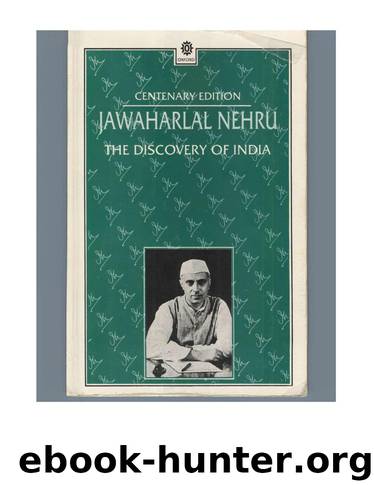The discovery of India by Jawaharlal Nehru

Author:Jawaharlal Nehru [Nehru, Jawaharlal]
Language: eng
Format: epub
Published: 0101-01-01T00:00:00+00:00
attitude was necessary and no truck with nationalism and sedi-
tion. The Aligarh College group had become the leaders of the
new Moslem intelligentsia and influenced sometimes openly,
more often from behind the scenes, almost every Moslem move-
ment. The Moslem League came into existence largely through
their efforts.
Abul Kalam Azad attacked this stronghold of conservatism
and anti-nationalism not directly but by spreading ideas which
undermined the Aligarh tradition. This very youthful writer
and journalist caused a sensation in Moslem intellectual circles
and, though the elders frowned upon him, his words created a
ferment in the minds of the younger generation. That ferment
had already started because of events in Turkey, Egypt, and Iran,
as well as the development of the Indian nationalist movement.
Azad gave a definite trend to it by pointing out that there was
no conflict between Islam and sympathy for Islamic countries
and Indian nationalism. This helped in bringing the Moslem
League nearer to the Congress. Azad had himself joined the
League, whilst yet a boy, at its first session in 1906.
The Al-Hilal was not approved of by the representatives of
the British Government. Securities were demanded from it under
the Press Act and ultimately its press was confiscated in 1914.
348
Thus ended the Al-Hilal after a brief existence of two years.
Azad thereupon brought out another weekly, the Al-Balagh,
but this, too, ended in 1916 when Azad was interned by the
British Government. For nearly four years he was kept in intern-
ment, and when he came out at last he took his place imme-
diately among the leaders of the National Congress. Ever since
then he has been continuously in the highest Congress Execu-
tive, looked upon, in spite of his youthful years, as one of the
elders of the Congress, whose advice both in national and poli-
tical matters as well as in regard to the communal and minority
questions is highly valued. Twice he had been Congress presi-
dent, and repeatedly he has spent long terms in prison.
The other weekly that was started in 1912, some months before
the Al-Hilal was The Comrade. This was in English and it influen-
ced especially the younger English-educated generation of Moslems.
It was edited by Maulana Mohammad Ali, who was an odd
mixture of Islamic tradition and an Oxford education. He began
as an adherent of the Aligarh tradition and was opposed to any
aggressive politics. But he was far too able and dynamic a per-
sonality to remain confined in that static framework, and his
language was always vigorous and striking. The annulment of
the Partition of Bengal in 1911 had given him a shock and his
faith in the bona fides of the British Government had been shaken.
The Balkan Wars moved him and he wrote passionately in
favour of Turkey and the Islamic tradition it represented. Pro-
gressively he grew more anti-British and the entry of Turkey in
World War I completed the process. A famous and enormously
long article of his (his speeches anb writings did not err on the side
of brevity or conciseness) in The Comrade entitled 'The Choice of
the Turks' put an end to The Comrade which was stopped by the
government. Soon after, government arrested him and his brother
Shaukat Ali and interned them for the duration of the war and a
year after.
Download
This site does not store any files on its server. We only index and link to content provided by other sites. Please contact the content providers to delete copyright contents if any and email us, we'll remove relevant links or contents immediately.
Fanny Burney by Claire Harman(26597)
Empire of the Sikhs by Patwant Singh(23072)
Out of India by Michael Foss(16848)
Leonardo da Vinci by Walter Isaacson(13315)
Small Great Things by Jodi Picoult(7121)
The Six Wives Of Henry VIII (WOMEN IN HISTORY) by Fraser Antonia(5496)
The Wind in My Hair by Masih Alinejad(5091)
A Higher Loyalty: Truth, Lies, and Leadership by James Comey(4951)
The Crown by Robert Lacey(4806)
The Lonely City by Olivia Laing(4798)
Millionaire: The Philanderer, Gambler, and Duelist Who Invented Modern Finance by Janet Gleeson(4465)
The Iron Duke by The Iron Duke(4349)
Papillon (English) by Henri Charrière(4262)
Sticky Fingers by Joe Hagan(4188)
Joan of Arc by Mary Gordon(4100)
Alive: The Story of the Andes Survivors by Piers Paul Read(4018)
Stalin by Stephen Kotkin(3956)
Aleister Crowley: The Biography by Tobias Churton(3633)
Ants Among Elephants by Sujatha Gidla(3460)
